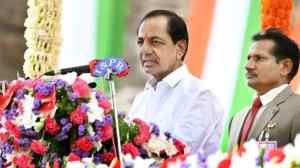‘We are in a golden cage’: Sonam Wangchuk claims Centre reneged on promises made to people of Ladakh
Sonam Wangchuk said Ladakh got a colony-type rule by the Lieutenant Governor after the abrogation of Article 370.
 Ladakh Environmental Activist Sonam Wangchuk meets Left leaders Brinda Karat and John Brittas during their ongoing hunger strike at the Ladakh Bhavan in New Delhi on Monday. (Express Photo by Tashi Tobgyal)
Ladakh Environmental Activist Sonam Wangchuk meets Left leaders Brinda Karat and John Brittas during their ongoing hunger strike at the Ladakh Bhavan in New Delhi on Monday. (Express Photo by Tashi Tobgyal)Climate activist and education reformer Sonam Wangchuk, who resumed his indefinite fast on Sunday in protest against the government’s lack of conversation on the Ladakh issue, claimed on Monday that the Centre has reneged on promises made to the people of Ladakh after the abrogation of Article 370.
On entering Delhi as part of the Dilli Chalo Padyatra, Wangchuk and other activists were detained on September 30 but later released after they began fasting inside the police station. The protesters had demanded two conditions for breaking their fast: a visit to Rajghat to pay their respects to Mahatma Gandhi on his birth anniversary and a meeting with one of the top leaders—the Prime Minister, President, or Home Minister. However, despite assurances from the authorities, no meeting was scheduled.
Speaking To The Indian Express, Wangchuk said, “They told us that they couldn’t assure us a meeting because the leaders would be extremely busy, so we asked them to give us a date, even if it was weeks later, so we could decide whether to go back to Ladakh or stay in Delhi, and they had agreed to give us a date by October 4, on which condition we had agreed to break our fast on October 2 and to not hold a massive demonstration at Jantar Mantar the next day.”
After receiving no further correspondence from the government by October 4, Wangchuk resumed his fast, accusing the government of trying to deceive the protesters. “They can fool us once, but they can’t fool us twice. They wanted us to leave for Ladakh so that we would lose all the attention the Dilli Chalo Padyatra had brought to the issues…. So we decided to proceed with the Anshan for which we asked for permissions to do it at Jantar Mantar, which would have been a valid place to hold the indefinite strike. We even signed an agreement that it would be only from 10 am to 5 pm, but it was rejected.”
“Despite asking for permission multiple times, they refused. So we decided to sit at Ladakh Bhawan for the Anshan, expecting to be detained again, but surprisingly, nothing has happened so far…,” he added.
Wangchuk said Ladakh’s grievances stem from what he describes as the government’s failure to deliver on promises made before and during the abrogation of Article 370. When asked about the support he had shown during the abrogation, he said, “Our support wasn’t about 370 itself; we wanted to get out from under Kashmir and become a Union Territory (UT). ”
While Ladakh rejoiced at becoming a UT in 2019, Wangchuk clarified that the region had expected a UT with its own legislature. “Instead, we got a colony-type rule by the Lieutenant Governor (L-G). There’s no people’s participation, and the L-G’s word is law,” he remarked.
“This was promised in official meetings and was even at the top of their manifesto in the 2019 and 2020 elections. We supported the move (370 abrogation) because we thought that something recorded in an official meeting and promised during elections would be implemented but we were let down in the next two to three years. We learned that they are not even willing to discuss that.”
Criticising the lack of consultation on Ladakh, he said, “Right now, it’s not better than it was before the abrogation of Article 370… It’s like we jumped out of the frying pan and into the fire.”
Comparing the situation to a cage, Wangchuk argued that while the government touts its increased budget for Ladakh, the region lacks real autonomy. “They say they have tenfolded the budget for Ladakh, but for what? The budget is decided by a single person who doesn’t understand the region. He comes for three years, takes two to understand the area, makes mistakes, and then leaves. We are in a golden cage.”
Despite the current situation, Wangchuk expressed hope that Ladakh’s plight would not be permanent. “I want to believe that we’re in transition and that our leaders will understand what we are saying. When it served them, they were happy to have our support during the abrogation, but now that we remind them of their promises, they are not happy anymore.”












